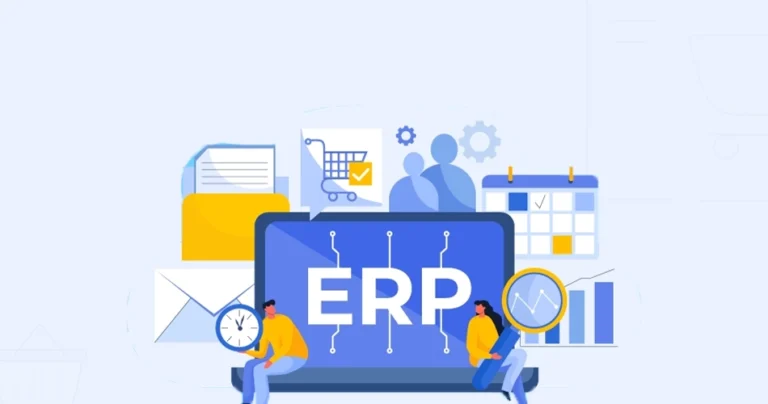Trying to streamline the critical operations on your eCommerce website? Then integrating ERP is crucial. It will give you a more comprehensive idea on stuff like inventory levels, order processing, customer data, and financial performance. With real-time insights, you can make more informed decisions for better growth and efficiency.
Although integrating ERP with your eCommerce platform is a complex process needing careful planning and execution, the benefits will make it worth your effort. That’s why the eCommerce development services regard ERP as one of the crucial undertakings for their projects.
But how do you integrate ERP into eCommerce websites? And what kind of benefits will it offer? We’ll find out through this blog. Let’s begin.
What is ERP?
ERP, or Enterprise Resource Planning, is a system that brings all core functions of a business (or website) together into one single platform. It’s like the central nervous system of your business operations.
It handles everything from finances and accounting to inventory management, order processing, and even CRM. For eCommerce websites, ERP serves as the foundation for efficient store management. With it, you can streamline the operations, improve accuracy, and make data-driven decisions for better sales and profitability.
Key Features of ERP
Here are a few of the core features of ERP (for eCommerce websites):
- Inventory Management: Accurate real-time tracking of stock levels, low stock alerts, and automated reordering.
- Order Management: Efficient order processing, eCommerce fulfillment, and shipping management.
- Customer Relationship Management (CRM): Centralized customer data, personalized interactions, and improved customer service.
- Financial Management: Accounting, invoicing, payment processing, and financial reporting.
- Supply Chain Management: Supplier management, purchase order processing, and inventory control.
- Business Intelligence (BI): Business intelligence features like data analysis and reporting for informed decision-making.
- Sales and Marketing: Sales forecasting, promotions management, and customer segmentation.
- Warehouse Management: Efficient warehouse operations, including picking, packing, and shipping.
Your eCommerce business can leverage these features for significant advantages in terms of efficiency, accuracy, and profitability. Speaking of the benefits, let’s see why eCommerce experts consider ERP as an important integration.
Benefits of ERP eCommerce Integration
Let’s see why ERP is an important integration for eCommerce websites.
- Streamlined Order Processing: Automated order transfer from eCommerce to ERP reduces manual errors and speeds up fulfillment.
- Inventory Accuracy: Real-time inventory updates prevent stockouts and overstocks, optimizing inventory levels.
- Reduced Manual Data Entry: Automation eliminates redundant data entry, saving time and reducing errors.
- Data-Driven Insights: Access to comprehensive data enables informed decisions about product assortment, pricing, and marketing strategies.
- Sales Performance Analysis: Track sales trends, customer behavior, and product performance to optimize business strategies.
- Financial Visibility: Gain insights into financial performance and identify areas for cost reduction.
- Accurate Product Information: Real-time product availability and accurate pricing information enhance customer trust.
- Faster Order Fulfillment: Efficient order processing and shipping lead to improved customer satisfaction.
- Personalized Customer Experience: Utilize customer data to offer tailored recommendations and promotions.
- Flexible Foundation: An integrated ERP system can support business growth by handling increased order volume and complexity.
- New Channel Integration: Easily integrate additional sales channels (e.g., marketplaces, mobile apps) with your ERP.
- Operational Efficiency: Maintain efficiency as your business expands by automating processes.
All in all, it’s a great way to improve efficiency, profitability, and customer satisfaction, which is why many businesses seek eCommerce consulting when planning ERP integrations for their online stores.
But for that, you need to integrate ERP into your eCommerce website in the best way possible. So what is the best ERP integration for eStores?
Top 7 ERP Integrations for eCommerce
The best ERP for your eCommerce website would depend on what type of ERP you want to opt for. In general, there are three types of ERP integrations for eStores.
- Generalist: For businesses with diverse operations and complex needs.
- Modular: For businesses with specific needs and looking for a scalable solution.
- ERP Suites: For large enterprises with complex operations requiring a unified system.
Now, let’s cover the best systems to integrate ERP into your eCommerce website.
Oracle NetSuite
Oracle NetSuite is a comprehensive cloud-based ERP solution offering a robust eCommerce platform that seamlessly integrates with other core business functions like financial management, CRM, inventory control, and warehouse management.
This ERP is known for its scalability and adaptability, making it suitable for businesses of all sizes, from startups to large enterprises.
Strengths: Comprehensive suite, strong eCommerce focus, scalability, global reach.
Best for: Businesses seeking a unified platform with advanced features.
SAP Business ByDesign
Designed specifically for mid-sized businesses, SAP Business ByDesign provides a user-friendly interface and pre-configured workflows to simplify implementation and ongoing use. Its strong eCommerce capabilities include order management, inventory management, financials, CRM, and business intelligence tools.
This comprehensive suite empowers businesses to gain real-time insights into their operations and make data-driven decisions for growth.
Strengths: User-friendly, pre-configured workflows, suitable for mid-sized businesses.
Best for: Companies looking for a balanced ERP with strong eCommerce capabilities.
Microsoft Dynamics 365
Microsoft Dynamics 365 offers a flexible platform with a robust suite of eCommerce features that can be customized to meet the specific needs of your business. Dynamics 365 Commerce seamlessly integrates with other Microsoft products, such as Microsoft Office 365 and Power BI, enhancing productivity and data management across your organization.
This integration allows you to leverage familiar tools and streamline workflows for a more cohesive user experience.
Strengths: Flexibility, integration with other Microsoft products, robust eCommerce module.
Best for: Businesses already invested in the Microsoft ecosystem.
Acumatica
A cloud-based ERP known for its scalability and adaptability, Acumatica offers a modular approach to ERP, allowing businesses to select the functionalities they require. Its strong eCommerce capabilities include order management, inventory management, product information management, among others.
This modular approach makes it a cost-effective option for businesses that don’t need a full-fledged ERP suite but still want robust eCommerce functionality.
Strengths: Scalability, modular approach, strong eCommerce features.
Best for: Companies needing a customizable ERP with a focus on growth.
Brightpearl
Specifically designed for eCommerce retailers, Brightpearl offers a comprehensive platform with a focus on order fulfillment, inventory management, and financial management. Its user-friendly interface and robust automation features streamline operations and improve efficiency.
Brightpearl’s integration capabilities allow it to connect seamlessly with various eCommerce platforms, shipping carriers, and payment gateways. That creates a centralized hub for managing your entire online sales ecosystem.
Strengths: Specifically designed for eCommerce, strong order fulfillment and inventory management.
Best for: Online retailers prioritizing order processing and inventory control.
Infor CloudSuite Industrial
Primarily focused on manufacturing and distribution, Infor CloudSuite Industrial also offers robust features and functionalities to cater to the needs of eCommerce businesses. This includes integrated eCommerce capabilities such as order management, inventory management, pricing, and warehouse management.
It can help gain better visibility into their entire supply chain, identify and address potential bottlenecks, and optimize production processes. So the customer demands can be met effectively.
Strengths: Focus on manufacturing and distribution, eCommerce capabilities for these industries.
Best for: Companies in manufacturing or distribution seeking integrated ERP and eCommerce.
Epicor
Epicor is an industry-specific ERP solution with a strong focus on manufacturing and distribution. It caters to businesses in these sectors by offering robust functionalities specifically designed to address their unique challenges and requirements in an eCommerce environment.
This ERP provides integrated eCommerce capabilities such as order management, inventory management, pricing, and warehouse management. That will make tasks like managing online orders, ensuring accurate fulfillment, and maintaining inventory much more streamlined.
Strengths: Similar to Infor, industry-focused with eCommerce capabilities.
Best for: Businesses in manufacturing or distribution requiring industry-specific features.
Although these are the top options, make sure you choose the most suitable one after careful deliberation. Consider factors like business size, core processes, budget, required features, and more.
Now, let’s say you have chosen a suitable ERP for your eStore. How do you integrate it?
How to Integrate ERP into eCommerce?
You can integrate ERP into your eStore using three distinct methods: Integration Platform as a Service (IPaaS), Point-to-point integration, and Enterprise Service Bus (ESB). Each approach presents distinct advantages and challenges, and the optimal choice depends on a careful evaluation of various factors.
Integration Platform as a Service (IPaaS)
IPaaS has emerged as a popular choice for integrating ERP and eCommerce systems due to its flexibility, scalability, and rapid deployment capabilities. This approach provides a cloud-based platform with pre-built connectors and data mapping tools. It significantly reduces the complexity and time required for integration.
It is particularly suitable for businesses with multiple integrations, as it offers a centralized management console and the ability to handle varying data volumes and formats.
However, while IPaaS excels in agility, it may not provide the same level of granular control and performance optimization as custom-built integrations.
Point-to-Point Integration
Point-to-point integration offers maximum customization and control over data exchange between ERP and eCommerce systems. This approach is ideal for organizations with specific integration requirements that cannot be met by pre-built connectors or when performance is a critical factor.
However, it demands significant development effort and becomes increasingly complex to manage as the number of integrations grows. Plus, it’s prone to errors. And more importantly, this method is recommended for smaller-scale or highly specialized integration projects.
Enterprise Service Bus (ESB)
ESB provides a robust and scalable integration architecture by acting as a central hub for message routing and transformation. It is well-suited for complex integration scenarios involving multiple systems and high data volumes. ESB offers flexibility in handling various integration patterns, protocols, and data formats.
However, it requires specialized IT skills to implement and manage, and the initial investment can be substantial. Additionally, the complexity of ESB can make it challenging to maintain and troubleshoot.
You can choose between these methods based on factors like integration complexity, your IT resources and expertise, and scalability requirements. Also consider budget constraints, data security, and compliance.
To Summarize
Nowadays, integrating your eCommerce website with ERP is quite important. It ensures streamlined order processing, accurate inventory management, enhanced customer experience, and data-driven decision making.
While the integration journey may present challenges, the rewards are substantial. Careful planning, considering factors like business size, integration method, and ERP features, is crucial for a successful implementation. Make sure you implement continuous monitoring, data validation, and optimization to maximize the benefits.
If you need help with the ERP integration, talk to our experts today!
FAQs on eCommerce ERP Integration
future-of-ecommerce

